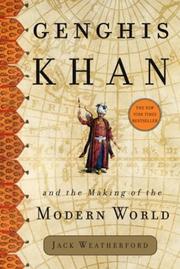

But here we focus on the first and most influential of these works.Īside from selling extraordinarily well, Weatherford’s book also received accolades from the press and the government of Mongolia itself. Weatherford advanced his ideas in later works, namely The Secret History of the Mongol Queens: How the Daughters of Genghis Khan Saved His Empire (2010) and Genghis Khan and the Quest for God: How the World’s Greatest Conqueror Gave Us Religious Freedom (2016).

Washing away the medieval order, Weatherford argues, the Mongol Empire brought in an epoch of free trade, transfer of ideas and religious tolerance which became the foundation for the world today. Rather than the Mongol Empire ushering in only bloodshed and chaos, Weatherford demonstrates that the empire had significant consequences for the history of the world. Let’s take a look at whether this book was successful at this goal.Ĭhallenging the notion of Chinggis Khan as a mindless, bloodthirsty brute, Weatherford sought a more nuanced picture, of a more farsighted man seeking stability for himself and his people.

The book sets out to a mighty task: offering a reevaluation of the Mongol imperial founder. Jack Weatherford’s 2004 book Genghis Khan and the Making of the Modern World quickly became one of the top-selling works on Chinggis Khan and the Mongol Empire.


 0 kommentar(er)
0 kommentar(er)
